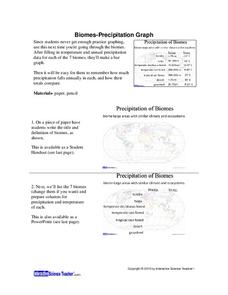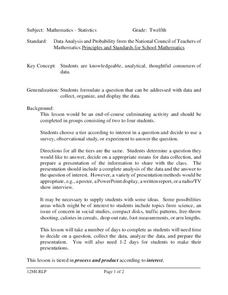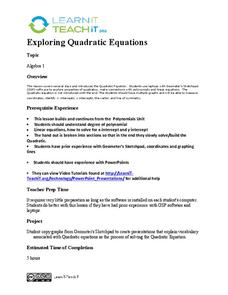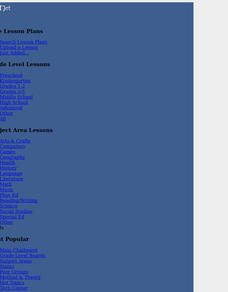Curated OER
Order of Operations
Students analyze the Order of Operations. They play a game to explore Order of Operations and observe a PowerPoint presentation slide sow. They generate patterns and functions to represent and solve problems. Students model and solve...
Curated OER
What is It? Susie Sees!
Students explore the five senses. In this cross curriculum five senses instructional activity, students view an "I Can See Colors" PowerPoint presentation and sort items by color and shape. Students mix primary color paints to...
NOAA
Tracking a Drifter
Be shore to use this drifter resource. The third installment of a five-part series has learners using the NOAA's Adopt-a-Drifter website to track to movement of a drifter (buoy) in the ocean. Graphing the collected data on a map allows...
Asian Art Museum
Create Your Own Samurai (Breastplate) Armor
Your class is going to love this activity. They get out their rulers, cardboard, and paints as they make Samurai breastplates. The simple art lesson lends itself to many different subjects such as, math/measurement, world history, and...
Curated OER
Dream! (Part One)
Students share with the class what they want to be when they grow up. As a class, they identify what they want to be for Halloween as well. They are videotaped stating their dream and photographed with their mask. Using the masks, they...
Curated OER
Search and Rescue Project
Students create a search and rescue party. In this geometry lesson, students simulate a rescue operation using math. They calculate the time, rate and solve word problems related to the real world.
Curated OER
Biomes: Precipitation Graph
Students practice graphing by studying biomes. In this precipitation lesson, students graph the precipitation patterns for the 7 biomes on Earth. Students view a PowerPoint presentation in class which explores the 7 biomes...
Curated OER
Tessellations Lesson
Fifth graders demonstrate their understanding of tessellations by watching a teacher prepared Powerpoint presentation and completing an activity. The students work independently to identify tessellations.
Curated OER
Factoring Trinomials
Students factor trinomials. In this algebra lesson, students use special patterns and formulas to factor. They utilize algebra tiles as a hands-on method for gaining practice with trinomials.
Curated OER
Multiplying Binomials
Learners factor binomials and apply it. In this algebra lesson, students use patterns to factor difference of squares and FOIL to factor other binomials. They apply the concept of binomials to vertical multiplication.
Curated OER
PASS the Arts
Learners explore math and art concepts, create digital art examples of the concepts, and incorporate these works into a PowerPoint portfolio with explanation and analysis.
Curated OER
Tantalizing Tessellations - Lesson I
Students complete a chart (KWL) as a pre-assessment, study the history of tessellations (tilings), investigate the properties of tessellations, and make and evaluate photographs of "found tessellations" for a PowerPoint/HyperStudio...
Curated OER
Review for the Algebra One SOLs
Students review the standards for Algebra I. Using the text, they discover two problems that match each standard and solve them showing all steps on paper. They create a PowerPoint slide for each problem and go through the correct...
Curated OER
Butterfly Adventure
Students in second grade are paired with fifth grade computer research buddies. They observe the characteristics of caterpillars, and identify the four stages of the caterpillar to butterfly life cycle. They graph the number of...
Curated OER
Global Greenup
Students utilize satellite images to track the life cycle of vegetational growth over a large area. Animal migratory patterns are compared to this cycle.
Curated OER
Migration Nation
Students study the concept of animal migration. They explore the migratory patterns of four different animals. Specifically, they search for on-line information about the natural history of animals and explore reasons why animals might...
Curated OER
Solving Story Problems
Eighth graders use a model to write and solve a story problem. They design a PowerPoint presentation outlining the steps to solve the problem. Students construct a diorama of a scene in the story problem.
Curated OER
Data Analysis
Twelfth graders collect and analyze data. In this secondary end-of-course mathematics activity, 12th graders formulate a question they would like to answer and decide on an appropriate means of data collection. Students...
Curated OER
Exploring Quadratic Equations
Eleventh graders explore quadratic equations. In this Algebra II lesson, 11th graders use Geometer’s Sketchpad to explore the properties of quadratics and the connections with polynomials and linear equations. The lesson is...
Curated OER
Polluting the Environment
Fourth graders construct mini-ecosystem, pollute the ecosystem, observe, collect, and record data on the effects of these pollutants on their ecosystem, organize data on spreadsheets, create graphs, and design presentations to share with...
Curated OER
Using Excel To Teach Probability And Graphing
Students engage in the use of technology to investigate the mathematical concepts of probability and graphing. They use the skills of predicting an outcome to come up with reasonable possibilities. Students also practice using a...
Curated OER
Using Excel to Reference and Graph Live Data from a Web Site
Middle schoolers collect live buoy data about water temperatures in the Gulf of Mexico from the Internet and work individually to organize their data and create a line graph using Excel Spreadsheet. Students analyze their data and...
Curated OER
Pythagorean Theorem Spreadsheet
Studetns use a spreadsheet to organize data on the sides of a triangle. They use the Pythagorean Theorem and the If then spreadsheet function to decide whether the three sides determine a right triangle. Young scholars work individual...
Curated OER
Lesson Exchange: Polygons (Middle, Mathematics)
Pupils discover the relationship between the sides of a polygon and the number of diagonals that can be drawn from one vertex, the number of triangles that those diagonals form, and the sum of the interior angles of that polygon.























